|
|
|
Sort Order |
|
|
|
Items / Page
|
|
|
|
|
|
|
| Srl | Item |
| 1 |
ID:
134077
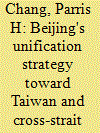

|
|
|
|
|
| Publication |
2014.
|
| Summary/Abstract |
For almost a decade, Beijing has pursued a "soft" approach toward Taiwan, cultivating economic ties and political exchanges in its pursuit of reunification. Following the end of President Chen Shui-bian's term in office, which was marked by constant tensions and several crises with China, Beijing has colluded with his successor, Ma Ying-jeou to pursue a policy of economic integration with the mainland. Beijing's
strategy toward Taiwan under Chairman Xi Jinping and his predecessor Hu Jintao has yielded positive results. The approach not only avoids possible military conflict with the United States, but receives support from Washington. Beijing's economic means, such as the Economic Cooperation Framework Agreement (ECFA), have enhanced Taiwan's economic integration with China and greatly increased the
PRC's control over Taiwan's economy and society, helping to lock Taiwan into the mainland's orbit. Likewise, Beijing has developed tools that allow it to intervene directly in Taiwanese domestic politics. However, efforts to use ties with President Ma to bring Taiwan farther into the PRC orbit have backfired, resulting in a weakened presidency that cannot deliver Beijing's goals. Thus, Beijing appears to be looking ahead to the next two elections, trying to make as much progress as possible before Ma leaves office, while simultaneously trying to establish ties with possible successors and the opposition DPP. In 2012, Beijing's intervention assisted the reelection of President Ma. It is sure to try again in Taipei's mayoral election in 2014 and the presidential/parliamentary elections in 2016.
|
|
|
|
|
|
|
|
|
|
|
|
|
|
|
|
| 2 |
ID:
132813
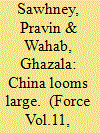

|
|
|
|
|
| Publication |
2014.
|
| Summary/Abstract |
India's national security, especially its defence preparedness against Pakistan and China, with whom it has disputed border, is passing through a disturbing phase. Pakistan continues with cross border terrorism into Jammu and Kashmir, while China infringes upon Indian land and air space from Ladakh to Arunachal Pradesh at will. Both have made a mockery of the military-held lines with India.
Speaking in Parliament during the recent budget session, defence minister Arun Jaitley expressed satisfaction regarding the two disputed borders. According to him, the Indian Army has minimised infiltration across the Line of Control and terrorism in the hinterland with a mix of good anti-infiltration deployment, monitoring and surveillance means, and the fence. Chinese intrusions, he said, are because of differing perception of the disputed border by the two countries.
Do we want better detection and elimination of terrorists in Kashmir, or do we want to compel Pakistan to stop infiltration? If India does not intrude into Chinese land, why should China do this to India regularly?
India seems to have accepted low defence thresholds against both neighbours. This is worrisome. If Pakistan and China are not deterred by India and its military power, especially boots on the ground, will India's two-front war strategy work to compel them? Why is India spending nearly USD 49 billion annually, which excludes defence pensions and nuclear weapons capability, on defence when it appears blunted? Is there a way out for India without going to war with either or both?
India needs a transformation of its national security and defence thinking. It must know that China rather than Pakistan is its irreconcilable adversary, and the disputed border with China is India's singular core concern which impedes India's rise. Once this is grasped, a new approach to policy-making and warfare would emerge. China could be balanced by a political-military methodology, while peace could be made with Pakistan. India's warfare practised so far would alter drastically. With China as the main adversary, India would no longer be preparing to fight the last war better. With more domains like space, cyber, ballistic and cruise missiles, irregular warriors (terrorists) and nuclear weapons added to the conventional combat on land, air and sea, India will need different higher defence organisation and higher strategic organisation from those proposed so far. All this can be done without raising either annual defence allocations or ringing alarm bells in the region.
|
|
|
|
|
|
|
|
|
|
|
|
|
|
|
|
| 3 |
ID:
138748
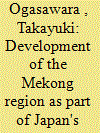

|
|
|
|
|
| Summary/Abstract |
Japan's active engagement in the development of the Mekong region since the 1990s needs to be understood not only from an economic but also from a diplomatic perspective. Japan seeks to collaborate with ASEAN in facilitating multilateral “political dialogue” in the Asia-Pacific region and building an East Asian order based on “universal values” such as democracy and the rule of law, and the Mekong region could be the “weakest link” of ASEAN. After outlining Japan's twenty-year undertaking to cultivate Mekong-Japan cooperation, the author suggests that it is time to broaden the scope of the cooperation and accelerate Japan's “proactive contribution to peace” policy to cope with the changing security environment.
|
|
|
|
|
|
|
|
|
|
|
|
|
|
|
|
| 4 |
ID:
128392
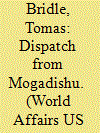

|
|
|
|
|
| Publication |
2014.
|
| Summary/Abstract |
We first saw Somalia's Parliament building from a distance, at the top of a hill overlooking Mogadishu and behind the closed arm of a checkpoint barrier. Our meeting with the speaker of Parliament was scheduled for 9:30 that morning, but the Ugandan soldiers manning the checkpoint-part of the African Union Mission in Somalia-would not let us proceed. Our names are not on the list of people with meetings in the Parliament, they told us, and they could not allow people not on that list to pass. There followed a flurry of phone calls to the aides who had arranged the meeting. But the soldiers, while polite, remained firm. They had their orders. We went back through town and tried to reach a group of MPs at another government building, but were again turned away. We consoled ourselves by noting that the soldiers' commitment to following the protocol for access to government buildings was a promising sign of their discipline and improving security conditions, but decided that it was time to give up trying to make the meeting happen that day.
|
|
|
|
|
|
|
|
|
|
|
|
|
|
|
|
| 5 |
ID:
165668
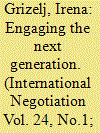

|
|
|
|
|
| Summary/Abstract |
Literature examining the participation of youth during peace processes is limited. Previous work has often focused on youth as “peacebuilders” and agents of change or threats to peace in the post-accord period, with little emphasis on how young people participate during the negotiation phase. This article seeks to fill this gap by assessing youth inclusion and participation in Myanmar’s ongoing peace negotiations. The study finds that, while youth have not had formal inclusion avenues in the peace negotiations, there are cohorts of young people who perceive themselves to be legitimate stakeholders in the peace process, who have attempted to gain access to decision-making in the peace negotiations, and have played active roles in supporting the process. It is argued that recognizing youth as key stakeholders in the peace accord will play a vital role in building sustainable peace within Myanmar’s nascent democracy.
|
|
|
|
|
|
|
|
|
|
|
|
|
|
|
|
| 6 |
ID:
159776
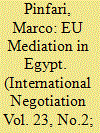

|
|
|
|
|
| Summary/Abstract |
This article reviews EU’s mediation attempts in Egypt between 2011 and 2013. After presenting the main challenges and opportunities of EU mediation in the Middle East-North Africa (MENA) neighborhood, EU interventions in Egypt are discussed in relation to the 25 January 2011 revolution, during the presidency of Mohammed Morsi, and after the 3 July 2013 coup d’état, focusing specifically on the choice of mediation styles and their timing. It is argued that three contextual conditions that are typical of the crises that erupt during failed democratic transitions – their fast pace, their eminently domestic nature and significant power asymmetries between the main parties involved – exacerbate the structural problems that the EU faces when intervening in countries that are not current or potential candidates for accession. The analysis of EU mediation styles during Egypt’s transition provides a critical perspective on EU’s foreign policy making after the Treaty of Lisbon.
|
|
|
|
|
|
|
|
|
|
|
|
|
|
|
|
| 7 |
ID:
103897
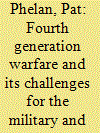

|
|
|
|
|
| Publication |
2011.
|
| Summary/Abstract |
This paper argues, primarily based on literature surveys, that warfare has changed fundamentally, and that the concept of Fourth Generation Warfare is an acceptable descriptor of the evolving potential of that change. This is a war in which the military instrument alone has very limited, but nonetheless essential, utility. This is not just a 'war amongst the people'; it is a war of the people. The global pursuit and ruthless defeat of the enemy centre of gravity - his ability to communicate - is central to success. For 'the people' to assume their role in this 4GW, there is a pressing requirement for a paradigmatic shift in mindsets and the thrust of political dialogue.
|
|
|
|
|
|
|
|
|
|
|
|
|
|
|
|
| 8 |
ID:
138057
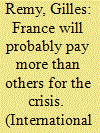

|
|
|
|
|
| Summary/Abstract |
I AM AFRAID that the Ukrainian developments have sucked us into another phase of fundamental changes, the second after the Soviet Union's disintegration twenty years ago. The continent is split which means detrimental and long-term repercussions for Europe. There is no new wall yet there is a crevasse which crosses the territory of a single European civilization called Russia and Europe in which people of Russia no longer feel at home.The Ukrainian crisis brought to the fore what had been going on during the last two decades: numerous political advantages lost amid diplomatic misunderstandings and economic blunders. The West, Europe in particular, is responsible to a great extent for the entanglements: when dealing with Russia Brussels deliberately ignored Russian culture and development dynamics; it proceeded solely from its own ideas about politics and the future order. The Russians, meanwhile, prefer a different development model while Putin is convinced that we are watching the decline of Europe and erosion of European values.
|
|
|
|
|
|
|
|
|
|
|
|
|
|
|
|
| 9 |
ID:
131457


|
|
|
|
|
| Publication |
2014.
|
| Summary/Abstract |
This research examines the role of the Lebanese Armenian diaspora (LAD) during the unstructured conflict that was the second Lebanese civil war, which extended from 1975 until 1990. This research has two aims. The normative aim is to find patterns of diasporic activity in conflict such as to support positive activities and discourage negative activities. A second is to focus on an empirical case study of the LAD in order to demonstrate that the diaspora encouraged peace-making initiatives and discouraged peace-wrecking. Importantly, the LAD as a political actor in Lebanese society played a positive role in promoting dialogue, cooperation, conflict resolution and reconciliation and had a significant impact on politics in general and conflict behaviour in particular. This study concludes that it is worth studying diaspora behaviour in conflict because a diaspora could be a powerful actor in conflict resolution and peace-making.
|
|
|
|
|
|
|
|
|
|
|
|
|
|
|
|
| 10 |
ID:
093733
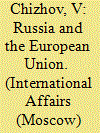

|
|
|
|
|
| Publication |
2009.
|
| Summary/Abstract |
RUSSIA AND THE EUROPEAN UNION are natural partners of high importance for each other in practically every sphere of international affairs. There are many factors responsible for their close cooperation. The most important among them are their geographic proximity, shared history, their belonging to the same European civilization, and adherence to the same moral and cultural values.
|
|
|
|
|
|
|
|
|
|
|
|
|
|
|
|
| 11 |
ID:
125562
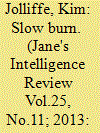

|
|
|
|
|
| Publication |
2013.
|
| Summary/Abstract |
After 65 years of conflict, Myanmar's government and opposition groups could be close to realizing a nationwide ceasefire, an achievement that would mark a step towards multilateral talks. Kim Jolliffe examines the many hurdles yet to be overcome.
|
|
|
|
|
|
|
|
|
|
|
|
|
|
|
|
|
|
|
|
|